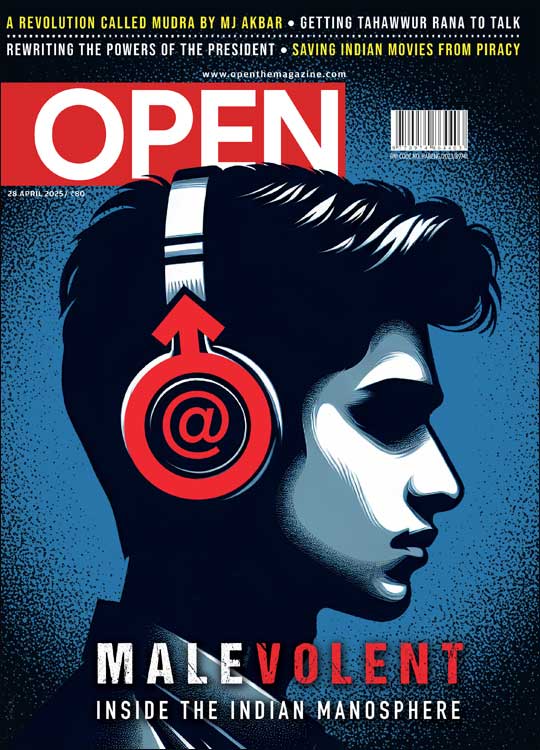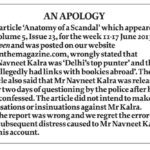Was This Man Framed?
The question why Madhu Koda was charged with money laundering is as unsettling as the supposed evidence against him. Speaking to Open, Jharkhand’s former Chief Minister is loud and clear that he is a victim of corporate greed in conspiracy with venal politics
 VK Shashikumar
VK Shashikumar
 VK Shashikumar
|
20 Apr, 2011
VK Shashikumar
|
20 Apr, 2011
/wp-content/uploads/2015/11/koda-framed.jpg)
The question why Madhu Koda was charged with money laundering is as unsettling as the supposed evidence against him. “Why am in jail?,” he asks
Forty-year-old Madhu Koda, a tribal politician without a political party, has been in jail since 30 November 2009 for allegedly laundering Rs 4,000 crore. As many as four government agencies—the Enforcement Directorate (ED), Department of Income Tax (IT), Central Bureau of Investigation (CBI) and Jharkhand Vigilance Department—have been probing the matter for 17 months now. A recent ED handout claimed that the agency ‘is all set to attach properties worth Rs 130 crore allegedly belonging to former Jharkhand Chief Minister Madhu Koda and his aides’.
This was supposed to be the first breakthrough in the ED’s investigation, as it went about tracking down the ‘proceeds of crime’—properties and assets acquired with the Rs 4,000 crore allegedly laundered while he led Jharkhand for two years till August 2008. By an order issued by the ED on 12 April 2011, a copy of which is with Open, properties of Quantum Powertech Pvt Ltd, Bharat Glass Tube Ltd, Bill Body Vyapar Pvt Ltd and IAG Company Ltd have been ‘attached’ (taken over by the State). There is no mention of any property owned by Madhu Koda in the ‘order’. This, despite the fact that on 4 March, the ED filed a chargesheet against Koda at a special court in Ranchi, that charged him with amassing illegal wealth of over Rs 1,340 crore.
The agency’s attachment order, read alongside the chargesheet, throws up an obvious question: if the ED has proof of Koda and his associates having amassed over Rs 1,340 crore through ill-gotten means, then why has less than one-tenth of the alleged ‘proceeds of crime’ been attached?
This is not all. The Income Tax department filed an affidavit at the Jharkhand High Court on 12 November 2009 that summarised its investigation as follows: ‘Search and seizure operation… was conducted in the case of Madhu Koda, Binod Kumar Sinha and Sanjay Choudhary on 31.10.2009. Altogether, 69 premises have been covered… seizure as per the last report is [Rs] 23.65 lakh and US $3,430’.
The IT department also informed the Court that it had written a letter to the ‘vigilance wing, Jharkhand, seeking information regarding misappropriation of public funds’ by Koda. The Jharkhand vigilance bureau filed a fresh chargesheet on 2 April 2011 against Koda, alleging that he took Rs 90 lakh from two of his associates to contest the 2009 Lok Sabha polls. Incidentally, two earlier vigilance cases against Koda and his associates were taken over by the CBI on 12 August 2010. By month end, the Jharkhand High Court had directed the agency to investigate the authenticity of a ‘sting’ CD that had been submitted to it. Open has a copy of this CD, as also the CBI report that authenticated its contents.
THE STING OPERATION
The sting was conducted on Advocate Ritu Kumar, lawyer of Durga Oraon—petitioner in the public interest litigation (PIL) that finally nailed Koda and others—and Rajendra Krishna, the then advocate of the Jharkhand government. It is still not clear why Oraon, a small-time real estate agent with no track record of activism against corruption, chose to file the writ petition (PIL) No 4700/2008 against 20 individuals, including seven politicians, demanding a CBI enquiry. The PIL alleged that the politicians had amassed wealth beyond their known sources of income while holding ministerial posts in the Jharkhand cabinet; those named were: Enos Ekka, Chandra Prakash Chowdhary, Bhanu Pratap Sahi, Dulal Bhuiya, Bandhu Tirkey, Hari Narayan Rai and Kamlesh Singh.
The specific cases against them are currently in various stages. But it is critical to note that Koda’s name did not figure in the original PIL. The petitioner, Oraon, had filed an interlocutory application (IA No 2978 of 2009) for impleading Koda, Sanjay Choudhary and Binod Sinha as respondents in the PIL. It was only after Koda’s name was thus dragged into the case that the law started tightening its grip on him. His industrialist friend Binod Sinha was also taken into custody.
The role of Oraon was known to all concerned. But not his motive. Was it just ‘public interest’? It was Saubhik Chattopadhaya, general manager at one of Binod Sinha’s companies, Emmar Alloys Pvt Ltd, who hit upon the idea of carrying out a sting operation on Oraon’s lawyer Ritu Kumar. He would pose as an agent of Sinha in need of her help (for a fee), to uncover her modus operandi and what he suspected was the real motive of Oraon’s petition against Koda. To do this, Chattopadhaya sought an appointment with the then government advocate, Rajendra Krishna (working under a post-Koda regime), met him on 2 February 2010, and requested him to fix a meeting with Kumar. Money wouldn’t be a constraint, he assured Krishna.
The CBI submitted a report to the court in November 2010. It was titled ‘A Report of CBI on Sting Operation in compliance with the direction of the Honorable High Court of Jharkhand at Ranchi arising out of WP (PIL) No 4700/2008’. The CBI report threw up the following:
» Advocate Kumar advised Chattopadhaya to contact a co-practitioner, advocate SP Rai, to draft an IA petition. She confirmed that she would ensure that the Vigilance and Income Tax departments were restrained from taking coercive action against Binod Sinha.
» Kumar agreed to take Rs 20 lakh per hearing to ensure that Sinha is not harassed by investigating agencies. Krishna repeatedly emphasised that the case against Sinha could be diluted if they “trusted each other”. Kumar, a lawyer fighting a case against Sinha, said “that he is a very good person but lacks maturity insofar as legal matters are concerned”. Kumar and Krishna went on to accept an advance of Rs 5 lakh from Chattopadhaya.
» Chattopadhaya, in order to have Kumar confirm her influence with the judiciary, suggestively said that the court “largely banks on your submission”. The CBI report notes that Kumar did not contest or refute this perception.
» In fact, Kumar discussed a legal strategy with Chattopadhaya to ensure that Sinha is not harassed. The latter said that if ‘they would get the assured relief, he would make the necessary arrangement of funds and the payment would be made as per her sweet will’.
» The CBI report states that, ‘Mrs Kumar lamented harassing so many persons. She assured Chattopadhaya that she would ensure that no injustice is meted out to them. She said that the truth would come to the fore… She said that what has been filed is a public interest litigation petition and not a personal interest litigation petition. Mrs Kumar said that she would right the wrong made by her while projecting the facts before the court.’
» The CBI report makes other startling observations. Kumar admits that she did not check documents handed over to her that formed the basis of the PIL filed in Oraon’s name. The report states that ‘she felt the need to seek the assistance of someone for scrutinising the documents.’ She admitted she had made mistakes during her submissions to the court. For instance, she had submitted that Sinha is not a taxpayer, whereas Sinha has been paying income tax since 1985.
» The CBI report states that Kumar said that the ‘target’ was to ward off the possibility of the cases being entrusted to the CBI. She went on to say that ‘if sizeable number of persons were impleaded, it would be beneficial for them [Koda, Sinha and others].’
» There is a bombshell in the CBI report, tucked away on page 19. ‘Mrs Ritu Kumar divulged that it was Rajendra Krishna who acted behind the scenes and who prevailed upon her to get dismissed [sic] the petition against Shibu Soren. Rajendra Krishna said that the embarrassing situation they were faced with could have been avoided had the petition against Binod Sinha been dismissed.’
THE THICKENED PLOT
While the Supreme Court upheld the ongoing CBI enquiry on the disproportionate assets case, the staggering implications of Advocate Ritu Kumar’s assertion that she piloted the PIL as ‘per her will and that she had misdirected the High Court to add or delete the respondents against whom the investigations are operative’ need to be probed as well.
The sting suggests that Kumar agreed to take Rs 20 lakh per hearing to dilute the case against Sinha. She may also have been paid to file the PIL in Oraon’s name; if so, by whom? The details emerging from a plethora of legal documents, affidavits, chargesheets and official investigation reports only end up raising a question that can be ignored no longer. Is the former CM of India’s poorest state in jail because the big fish escaped the dragnet?
The Jharkhand State Bar Council found Kumar’s and Krishna’s misconduct so serious that it recommended ‘severe punishment’. Subsequent disciplinary proceedings held in March 2010 resulted in their names being struck off the roll of the Bar Council. They were debarred ‘from practising in any Court of Law for the rest of their life’.
With this, several holes have been punched in the PIL that supposedly exposed the ‘Rs 4,000 crore money laundering scam’. Moreover, investigation agencies are currently bogged down in a procedural labyrinth. Under the Prevention of Money Laundering Act, 2002, the act of identifying and attaching the ‘proceeds of crime’ must be preceded by a clear establishment of the crime.
So far, no investigating agency has even suggested that money from the state treasury was siphoned off and laundered. If Koda and his associates are guilty of accepting bribes in the form of money that was later laundered, this can only be established by submitting hard evidence of instances of bribery—together with how any of it influenced his policies in a manner amounting to abuse of authority.
But the voice of the man at the centre of this murky case hasn’t been heard ever since he was arrested. So, on 25 January this year, Open travelled to Ranchi to meet Koda.
THE VOICE OF VICTIMHOOD
Koda had just been admitted to the Rajendra Institute of Medical Sciences, Ranchi; he was suffering ill-health associated with high blood pressure and cervical spondylitis. Open spoke at length with him. What he had to say was stunning (see accompanying interview, “Why Am I in Jail?”).
“I regret being an ‘independent’ politician,” he says, alleging that private mining companies, in connivance with political parties, have had him thrown into prison to cover up their own greedy designs on Jharkhand’s mineral resources. The former CM says his troubles originate in a 20 August 2007 order: he had ordered the re-tender (seen as a rejection) of a proposal by the Kolkata-based private company Usha Martin for a mining joint venture (JV) with Jharkhand State Mineral Development Corp (JSMDC). “Usha Martin wanted a larger share of the mining pie…” says Koda, “They wanted to take over all the JSMDC mines through this indirect route of forging a JV. They were desperately pushing the JV file, despite a Jharkhand High Court order [disallowing the JV]. I was firm that I would not take any decision that violated the law, and so I rejected the file proposing the JV. Since that day, Madhu Koda was designated as an enemy of Usha Martin because he had rejected the company’s JV proposal. This is the behind-the-scenes reason for my troubles and for the cases registered against me.”
Koda’s stint as Jharkhand’s CM, the fifth of this new state carved out of Bihar in 2000, had been brief. He assumed office on 18 September 2006 and held it till 23 August 2008. Born to a poor miner’s family in West Singhbhum, he was a labour activist who joined politics and became a BJP legislator from Jaganathpur in 2000. He was appointed mines minister in Arjun Munda’s cabinet. In 2005, however, he was denied a BJP ticket and had to contest the Assembly polls as an independent candidate. He won his seat. Overall, it was a hung verdict, though, and in 2006 he assumed power as a balance-of-forces CM with support of the Congress, Rashtriya Janata Dal and Jharkhand Mukti Morcha’s Shibu Soren. The state has been afflicted with political instability ever since its formation, and so it was not too extraordinary for an independent to become CM (it had happened twice in India before).
Koda’s approach to governance was already clear by then. It was during his tenure as mining minister, a portfolio he retained as CM, that Koda claims to have first challenged the hold of companies like Tata Steel and Usha Martin over the state’s mining sector. “I had issued notices to these companies,” says Koda, “industries are allotted captive mining leases on the basis of an agreement with the government that the ore mined from these mines would be consumed in plants or factories located within the state. But Tata and Usha Martin violated the agreement and were selling the ore to other industries and buyers outside the state and earning huge profits. That is why my government issued ‘show cause’ notices to these companies.”
The former CM claims he wanted to expand his support base among tribals by leveraging his experience and learnings as a mine worker. “It is a natural principle that all benefits accruing from the natural resources of the land on which tribals have lived for centuries must be shared with them for their progress and development.” So he framed a policy of giving mining leases for minor minerals to tribal cooperative societies. It proposed charging private sector miners a royalty for operating major mineral mines, money that would go into a tribal development fund. The third major aspect of the policy, in the interests of a competitive sector, intended to break what he saw as the stranglehold of a few companies over Jharkhand’s mineral resources. Finally, Koda says he wanted to stop the practice of private companies selling mineral ore from captive mines leased to them by the government.
“Certainly, Usha Martin and Tata Steel are involved,” says Koda, referring to the origin of his travails, “Their involvement is invisible, but one can understand and experience their reach. I am certain about this. Some political parties are also supporting this conspiracy because they want to finish the public life and political career of Madhu Koda. Despite being an independent MLA, I rose to become the Chief Minister. In my area, I had enormous mass support. All of this was viewed adversely and as a threat by some political parties.”
(VK Shashikumar is affiliated with Three Headed Lion Research & Information Services—Mediagrove)
About The Author
CURRENT ISSUE
MOst Popular
3

/wp-content/uploads/2025/04/Cover-Manosphere.jpg)











More Columns
‘Colonialism Is a Kind of Theft,’ says Abdulrazak Gurnah Nandini Nair
Bill Aitken (1934 – 2025): Man of the Mountains Nandini Nair
The Pink Office Saumyaa Vohra